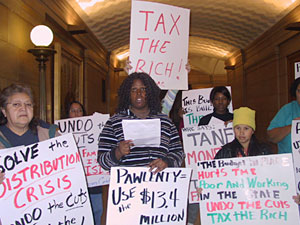|
Audio
Photos
More from MPR
Resources
Your Voice
|
More cuts possible as budget deficit resurfaces in Minnesota
December 3, 2003
 |
| Members of the Welfare Rights Committee protested outside the room where the forecast was released. (MPR Photo/Laura McCallum) |
St. Paul, Minn. — Over the past few years, Minnesota's fiscal condition has swung wildly from multi-billion-dollar surpluses to multibillion dollar deficits. So state Finance Commissioner Dan McElroy seemed happy to report a shortfall that pales in comparison to the projected $4.5 billion deficit that faced the last Legislature.
"I'm kinda saying today that it was a rocky mountain of deficits, and this is a speed bump. You know, we went from a 15 percent problem to a .6 percent problem. The economy's doing better, we can deal with this. It's pretty good news," he said.
 | |||
State economist Tom Stinson says while Minnesota's economy is picking up, the last forecast already assumed strong growth. He says state revenues have yet to reflect the strong third-quarter growth seen in national economic figures. The state is projected to spend less than originally predicted, but that's not enough to offset lower-than-expected state revenues, particularly from income and sales taxes.
Republican legislative leaders say the forecast shows that last session's budget fix was largely on target. House Majority Leader Eric Paulsen of Eden Prairie says the Legislature built up the state's budget reserves to more than $500 million, and that money could be used to resolve the new projected deficit.
"We took a $4.5 billion problem, which is really a $5 billion project because we added $500 million into the reserve, and so we've got cushion to use if we so choose to use it," Paulsen said.
Paulsen says balancing the budget without raising taxes was a wise move, and Republicans won't consider tax increases to erase the deficit. Gov. Pawlenty also stressed his commitment to not raising taxes to resolve the $185 million problem. His administration will recommend a budget fix to the 2004 Legislature. He says he'll wait to make a final proposal until the next forecast is released in February.
DFL legislative leaders say they'll wait and see what the governor proposes. Senate Majority Leader John Hottinger of St. Peter notes that Democrats proposed a mix of tax increases and spending cuts to balance the budget last session, but Republicans rejected their plan.
"They have been absolutely unwilling to take a balanced approach to the budget deficit, and once again, they're showing that they're unwilling to do that. We're not going to spend a whole lot of time trying to convince them; they're unwilling to listen," according to Hottinger.
Hottinger says Democrats will push for reprioritizing state resources to mitigate some of the effects of budget cuts in areas such as public safety and health care. While DFL leaders aren't calling for tax increases, some labor, faith-based and nonprofit groups are.
Marcia Avner, public policy director for the Minnesota Council of Nonprofits, says Minnesotans are beginning to feel the impact of higher fees and property taxes, and of the budget cuts to child care, health care and education programs. She says the Council of Nonprofits proposed a 10-percent income tax surcharge last session, and legislators should reconsider the idea.
"For families -- not individuals -- families with an income of $60,000, their additional tax would have been about $200. I think if people are paying attention to their budget, they're going to find out that in fees and in property tax increases and in the services that they can no longer access, they may find themselves exceeding that kind of an expenditure," she said.
Members of the Welfare Rights Committee protested outside the room where the forecast was released, calling for higher taxes on upper-income Minnesotans.
The group says upper-income Minnesotans haven't felt the effects of last session's budget fix. The Welfare Rights Committee is calling for restoring budget cuts that affected welfare recipients with a disabled family member and those in subsidized housing.
Finance Commissioner McElroy says the governor isn't ruling out restoring some of the budget cuts from last session. But McElroy says groups need to make a strong case for restoring funding - and show where the state will come up with the money.
|
News Headlines
|
Related Subjects
|
